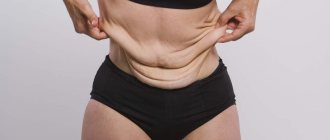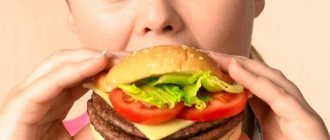Many athletes know about this statement that it is best not to eat for two hours after training. This type of diet helps you quickly burn a lot of fat and, accordingly, lose weight.
First off, how does it work? With more or less intense training, a person starts the fat burning process. This process continues for several hours after training. If a person begins to eat food, the body begins to take energy from the foods eaten, stopping fat burning. This is the main mistake of people who adhere to this diet.
Sometimes it can be very difficult to give up food. In this case, you can eat some dietary foods. This article describes ways to satisfy your post-workout hunger.
Method 2. Herbs
There are a huge number of herbs in nature that help quench your appetite. For example, hellebore is a herb that affects the stomach, reduces appetite, and cleanses the intestines. Flax seeds are also suitable, as they reduce the activity of the stomach between meals, reducing the amount of gastric juice. There are many more herbs you can find online, but flaxseed and hellebore are the most well-known and effective.
Fasting and exercise
Today there is a lot of talk about the system of intermittent fasting.
If you analyze the reviews about it, you get the impression of fairly high efficiency. Let's try to figure out how sports can be connected with fasting. Benefits of Intermittent Fasting for Athletes
Let's start with the advantages that fans of this technique talk about:
- Insulin sensitivity increases, and the body responds better to carbohydrates from food.
- Research has found significant improvements in health, affecting all systems of our body.
- Metabolic processes are accelerated.
- The body synthesizes norepinephrine more intensively, which leads to an increase in energy reserves.
- The production of somatotropin accelerates, which leads to a restructuring of energy metabolism to use fat, and protein compounds are used exclusively to solve plastic problems.
- Appetite decreases, although many are sure of the opposite. If you fast properly, your appetite will not increase.
- Convenient from a practical point of view, because there is no need to carry containers of food with you.
Quite often you can hear complaints from athletes that split meals do not allow them to reduce their appetite and everything happens exactly the opposite. Not every person can be satisfied with small portions of food and it may be better to eat less often, but eat a lot of foods at once. Only one thing is obvious in this matter - each person must find the optimal diet for himself.
Method 4. Protein products
Products that contain mainly protein (cottage cheese, boiled eggs, chicken breast, etc.) reduce the desire to eat without harming your figure. Post-workout proteins, like vegetables, are very beneficial as the body needs protein in order to repair damaged fibers. After training, the window for protein intake opens. In other words - anabolism. All the protein that a person eats goes towards restoring the body after exercise. A big plus of eating protein after a workout is that it does not contribute to fat gain.
Causes of hunger after exercise and how to avoid them
- Reason #1:
Train on an empty stomach. This is mainly practiced by those who exercise in the morning, immediately after work, and by those who think that they will lose weight faster this way. There is nothing useful for losing weight in this opinion, and on the contrary, it is harmful. So, if you go for a run in the morning, then at least your body has not received food for 8-10 hours, if after work, then 4-6 hours pass. Muscles work from glycogen reserves (this is a supply of glucose), fat is consumed from about 20 minutes of training. But by this time, glycogen reserves are already minimal, and during the workout the body begins to experience a lack of glucose, and, ultimately, will force you to replenish carbohydrate reserves, not with diet foods, but with sweets in excess. What to do? You need to eat before training. If you work out in the morning, fruit juice will be the best and fastest source of carbohydrates. It is better if it is freshly squeezed fruit juice - it is digested as quickly as possible and provides a portion of glucose. If classes are scheduled after work, then porridge and fruits rich in carbohydrates (bananas, for example) are suitable. Try it, find what suits you best. - Reason #2:
The workout is too long. This threatens those who study for more than 1.5 hours. To lose weight, moderate-intensity training is necessary, during which time the body “burns” fat. But carbohydrates also “burn” along with them. Thus, after a long workout, the body requires replenishing not only carbohydrates, but also fats. What to do? Eat a mid-workout snack. Sweet fruits, special sports foods and drinks will come in handy. - Reason #3:
Training in cold air. These include classes at temperatures of +10...+15 degrees, as well as in the pool. With them, energy is spent not only on movement, but also on maintaining body temperature, that is, to warm up. Therefore, after long swims, we feel a strong need for fatty and high-calorie foods, which are designed to restore the subcutaneous fat lost during the training process. What to do? Dress warmly. When the temperature drops, carry out outdoor activities wearing a hat, a warm jacket and gloves. And do not extend your workouts in the pool for more than 30 minutes. - Reason #4:
Exercising too intensely. The higher your heart rate and load, the more and faster your glycogen reserves will be spent, of course, and fats will be “burned”, but there will be more carbohydrates. Therefore, after a short period of time, you will end up with a situation similar to reason No. 1 - the result is a lack of glucose, severe hunger, and cravings for sweets. What to do? Know your limits. A 1-1.5 hour workout of medium intensity is ideal for weight loss. But if you really want to “give it your all,” take fruit with you for a snack, and after training, eat cottage cheese or a piece of boiled meat.
Often those who want to lose weight rush from one extreme to the other: after a sedentary lifestyle, they immediately begin an intensive training program in an attempt to get rid of excess weight. I have already written why too frequent and too intense training is not needed for good results. At the same time, we know that it is the amount we eat that directly affects our weight and appearance. The translation provides an excellent explanation of why intense and exhausting workouts only interfere with getting yourself in order.
Have you seen those cool T-shirts with the words “I run to eat pizza”, “I run because I like beer”, which generally sums up the way many people think about the relationship between nutrition and training.
Who hasn’t imagined during a workout that after conquering himself or herself, some tasty treat awaits him or her?
But what happens when our workout routine causes us to constantly overeat? Many of us associate regular fitness training with healthy eating and a lean, flexible frame, but perhaps to your surprise, the relationship between exercise and overeating has more biological and physiological basis than you might think.
But I need to replenish the glycogen in my muscles... Right?
If you are starting a new training program or adding challenges to your current program, your caloric needs will increase to support post-workout recovery and maintain glycogen stores. Usually our body clearly hints at this to us, naturally increasing appetite after exercise. But is it possible that after training we eat more than is actually physiologically necessary?
“For every 10 kcal that we burn, our body will require at least 3 additional kcal through a compensation mechanism whose task is to ensure a “full tank.” Some people exceed the increased requirement due to physical activity and a correspondingly accelerated metabolism, eating more than 11 additional kcal for every 10 burned, says trainer and author Matt Fitzgerald.
What are the reasons? This depends on a combination of physiological and psychological factors, some of which we are completely unaware of.
“Reward psychology often comes into play,” Fitzgerald says. “This happens more often with beginners who have no internal motivation to train; they just haven’t fallen in love with physical activity yet. If a beginner does not enjoy the process of training, then he can use food as a reward for himself - eating more than usual, or eating something that he would otherwise refuse.”
It’s one thing to cheer yourself up while running with the anticipation of a tasty snack, and another thing to find joy in food when you’re exhausted from training.
When Overtraining Causes Us to Overeat
Even if you don't consciously allow yourself to reward yourself with food, another common mistake is overestimating the number of calories burned during exercise and underestimating the calories taken in from food. This can happen whether we tend to overeat or not.
A study found that people trying to lose weight typically believe they eat 47% less and expend 51% more calories than they actually do. It turns out that we can regularly not only compensate for the calories burned, but also gain excess.
Biological explanation for increased appetite after exercise
Studies that have examined the effect of exercise on increasing appetite explain the mechanism of action of biological factors. For some people, especially those who are obese, intense exercise causes a surge in activity in the areas of the brain that control food pleasure and appetite. At the same time, the slimmer you become and the more accustomed you are to regular exercise, the weaker the urge to chew something will be.
Research has also looked at the brain activity of slimmer, fitter people and found that their brain's appetite centers responded much less actively to images of tasty food. This led the researchers to conclude that although increased physical activity may lead to increased appetite and food cravings in beginners, over time these cravings turn into healthy habits unbeknownst to the individual.
Professional nutritionist and Greatist expert Erica Giovinazzo reminds us that hunger is a sure step towards overeating. For beginners who are just adapting to the increased caloric expenditure of regular exercise, which naturally increases calorie needs, the effects of hunger are exacerbated.
“Whether you exercise or not, you should never let yourself feel hungry. If you are hungry, you eat much more than usual, simply because the need for food has already moved to a psychological level.” A hungry person will eat faster, which is why he will easily miss the moment when satiety comes, which usually takes about 15 minutes to realize.
What does she advise?
- Eat mindfully (try putting your fork down several times per meal and chewing more slowly),
- take the same portion that you would take if you were not hungry (most likely this portion will actually be enough for you),
- take a break from eating, get up from the table, it’s possible to eat (sometimes we don’t notice that we’ve already eaten until we get up).
conclusions
Hunger in body language is a request to refuel, so don't ignore hunger symptoms, especially if you've recently started exercising or increased your physical activity. An unusual increase in appetite may be a sign that your body and brain are adapting to new physical activities, but if you have uncontrollable cravings for tasty foods, it may mean that your brain is “jealous” and wants your attention in the form of rewards and stimulation of the pleasure centers.
Learn to distinguish hunger from an emotional desire to eat, and use this skill especially when your body adapts to a new load. More fruits and vegetables in your diet will help you achieve satiety more easily, and feeling full and drinking enough throughout the day is an excellent prevention of overeating.
When it comes to curbing your emotional cravings for food, remember that forcing yourself to exercise so hard that you want to reward yourself with something tasty later on only creates a vicious cycle of overeating.
Find the type of training that you like, sign up for your favorite classes, train with like-minded people, or prepare a selection of music for training that you will simply be delighted with. As you become more physically fit and exercise becomes more enjoyable, you will stop overeating on both a physiological and emotional level.
An increase in appetite during training is a normal physiological reaction of the body. When you exercise, you expend energy, and your body strives to replenish calories and restore balance by sending you hunger signals. The situation is different with psychological hunger. Most people overestimate calorie expenditure - they think that they spent a lot of calories during training and now they can not limit themselves. Let's figure out why you feel hungry after exercise and how to deal with it.
As mentioned above, the reasons can be physiological and psychological.
Physiological reasons:
- You spent energy during training, and the body strives to restore balance - this is natural and should not interfere with weight loss.
- You're doing too much cardio (working out for at least an hour every day). Excess aerobics creates considerable stress, which introduces an imbalance in. Stress increases the production of the stress hormone cortisol and the hunger hormone ghrelin, but reduces the level of the satiety hormone leptin.
- You're not eating enough calories. Perhaps your diet is so poor that you simply do not get enough. In addition, as a result, controlling appetite and losing weight becomes much more difficult.
- You don't sleep much. Lack of sleep reduces leptin levels, increases ghrelin and cortisol, and reduces insulin sensitivity. With a lack of sleep, the body tries with all its might to store as much energy as possible, increasing the feeling of hunger and.
Psychological reasons:
- You overestimate your caloric expenditure and feel that it is unfair to limit yourself.
- You mistake ordinary fatigue after a workout or thirst for hunger.
- You can't tell the difference between real hunger and food cravings.
According to studies involving athletes, moderate-intensity exercise does not increase hunger, and a balanced diet helps to better control appetite.
Overall, it must meet the following criteria:
- Adequate daily caloric intake. To calculate the daily requirement there is.
- . If frequent and small portions do not fill you up, then eat less often.
- Proteins, fats and carbohydrates in every meal. A balanced meal should contain at least 20 g protein, 10 g fat and 30 g carbohydrates.
- A sufficient amount in the diet. If you exercise regularly, then you need to receive 1.5-2 g of protein and 0.8-1 g of fat per kilogram of weight in your diet, eat vegetables and greens every day. Research shows that a combination of protein, fiber and fat helps control appetite.
- Solid food is better than liquid food. Liquid calories from smoothies, kefir, and juices are easily absorbed, and therefore the feeling of hunger after such a meal comes very quickly.
- Correct. Before and after training, you especially need proteins and complex carbohydrates. They nourish muscles for a long time and maintain normal sugar levels, which helps control appetite.
- Moderate intensity of strength training and a sufficient amount of cardio. You should not crawl out of the hall or live in it. If you want, then 2-4 strength training sessions and 150-300 minutes of cardio per week are enough.
- Attentiveness to your feelings. If you have a big breakfast and feel hungry in the evening, then maybe you should distribute your daily caloric intake so that you feel comfortable?
It is important to talk about awareness. When you feel hungry, ask yourself: Do I really feel hungry or is it a craving? What's behind it? Stress, boredom, fatigue, habit? Or maybe I want to reward myself for a successful workout or a lost kilogram? Pampering after a busy week? Don't be afraid of psychological work on yourself. Ask yourself questions and answer them honestly.
When you have managed to sort out your feelings and understand that this feeling in your stomach is the same hunger, it’s time to think about the right snack. Remember that solid foods and a combination of proteins, fats, and fiber fill us up? Therefore, the popular recommendation about an apple for a snack is no longer necessary.
Easy, quick and healthy snacks
- Vegetable sticks with sauce from;
- Crispbread with chicken meat and herbs;
- Crispbread with curd cheese;
- Low-fat cottage cheese with berries and nuts or moderate-fat cottage cheese with berries or fruit;
- Chicken breast salad;
- Whole grain toast with egg;
- Baked apple with cottage cheese.

Calculate your snack portion based on your daily caloric intake. Remember that snacks should be smaller than your main meals, but should also contain proteins, fats and carbohydrates.
We are willing to bet that you are training to lose weight, since the issue of increasing appetite after sports is relevant to you. You have worked physically, the body has spent energy and seeks to restore balance with the help of food. Hunger after a workout, especially a well-done one, is a completely normal reaction. Humble yourself. It’s another matter if this norm makes you overeat and ruins all your efforts in the gym. It doesn’t take long to get carried away by strange ideas about the dangers of sports for weight loss. Let's look at the problem.
Method 5. Drugs
There are many dietary supplements and medications that reduce hunger. They are effective, but, unfortunately, have side effects. Before taking these medications, you should consult your doctor or pharmacist to determine any contraindications, if any.

In general, there are many more methods to satisfy your post-workout hunger. If you do not want to gain weight, then the main rule is not to eat high-carbohydrate foods or foods containing large amounts of fat.
Do high-intensity training 3 times a week
The fact is that when doing heavy training, the body regulates the feeling of hunger. During exercise, blood is diverted from the gastrointestinal tract and flows to the muscles. This suppresses the release of the hormone ghrelin and slows down the absorption of food from the intestines.
Some studies have shown that people who did 30-45 minutes of high-intensity exercise on a stationary bike three times a week ate 120 fewer calories than those who continuously pedaled at a moderate pace.
You can also turn your favorite cardio workout into a high-intensity workout by increasing the load for 15-30 seconds, then returning to a moderate pace for 1-2 minutes.










